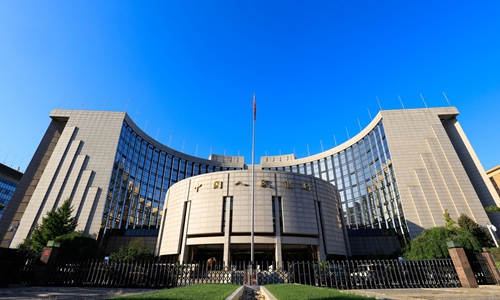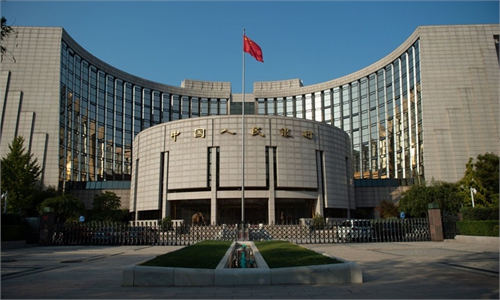PBC to guard against systemic financial risks, further defuse risks of outstanding local government debt: governor
Move to boost investor confidence, local govt economic growth

A view of the PBC's headquarters in Beijing Photo: cnsphoto
In its latest statement on the pursuit of high-quality financial development, the People's Bank of China (PBC), the country's central bank, vowed on Saturday to guard against systemic financial risks, including the outstanding local government debt.
The central bank will work to establish a long-term mechanism to handle local government debt risks, control new debt strictly and provide emergency liquidity to local governments with heavy debt burdens when necessary, PBC Governor Pan Gongsheng said during an exclusive interview with the Xinhua News Agency on Saturday.
Pan noted that China's financial risks are generally controllable, adding that the PBC will improve mechanisms for financial risk prevention, warning and management.
Pan made similar statements during the Financial Street Forum held in early November, noting that the overall debt level of the Chinese government is at the middle to lower range by international standards, and the authorities have taken multiple measures this year to support local governments to resolve debt risks.
"The central bank's stance has sent a signal that China has promised the world that there will be no financial systemic risks, which will boost the confidence of investors and market players," Hu Qimu, a deputy secretary-general of the digital-real economies integration Forum 50, told the Global Times on Sunday.
As of the end of October, outstanding local government debt stood at about 40.1 trillion yuan ($5.63 trillion), within the debt limit for local governments in 2023 approved by the first session of the 14th National People's Congress - which was about 42.17 trillion yuan, data from China's Ministry of Finance showed.
"The central bank's governor noted the importance of liquidity support for local governments. Problems with the liquidity of debt can lead to a halt in local operations and even a contraction of the economy as a whole. But the growth of debt must be matched by local economic development," Tian Yun, a veteran economist based in Beijing, told the Global Times on Sunday.
The central bank's statement indicates that it will continue to monitor the financial data of local governments and with other sectors to prevent liquidity risks, Tian noted.
The central government has sufficient policy tools to avoid systemic financial risks and ensure local economic development while resolving local debt problems, Hu noted.
Despite continuous Western media hype over China's alleged local government debt problem, the Chinese central government and provincial governments have implemented measures to support local governments in prudently addressing debt risks, which aim to alleviate the fiscal pressure of local governments and expand the role of local finance in boosting the development of local economies.
For instance, local governments are urged to raise funds to pay back debts through selling assets, including cash-generating ones. In addition, the authorities have guided financial institutions to help resolve existing debt risks and control new debts through a variety of measures, including debt extensions, debt swaps and loan rollovers.
According to thepaper.cn, 29 Chinese localities including North China's Inner Mongolia Autonomous Region and Tianjin Municipality have issued refinancing bonds this year to pay off debts, which has "made a good start for central and local governments to prevent local debt risks," Tian noted.
The latest development marked the re-start of the issuance of special-purpose refinancing bonds this year to allow local governments to swap local debts with higher-quality guaranteed bonds, observers said.
"It is also worth mentioning the issuance of additional 1 trillion yuan in special-purpose treasury bonds in October, which could help drive investment in local infrastructure and reduce local hidden liabilities," Tian noted, adding that the issuance showed that the central government will increase fiscal spending to help localities ease short-term debt pressures, especially at a time when economic downward pressure is more pronounced.
Hu noted that local governments will continue to control new debt and optimize debt allocation while ensuring the normal promotion of ongoing infrastructure projects.



